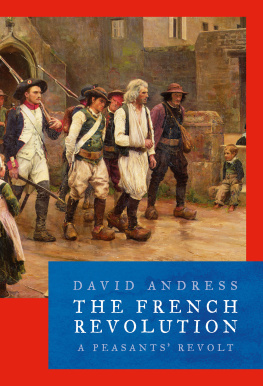JOHN MARKOFF
THE ABOLITION OF FEUDALISM
PEASANTS, LORDS, AND LEGISLATORS IN THE FRENCH REVOLUTION
THE PENNSYLVANIA STATE UNIVERSITY PRESS
UNIVERSITY PARK, PENNSYLVANIA
-iii-
This publication has been supported by the National Endowment for the Humanities, a federal agency which supports the study of such fields as history, philosophy, literature, and languages.
Library of Congress Cataloging-in-Publication Data
Markoff, John, 1942
The abolition of feudalism: peasants, lords, and legislators in the French Revolution / John Markoff.
p. cm.
Includes bibliographical references and index.
ISBN 0-271-01538-1 (cloth: alk. paper)
ISBN 0-271-01539-X (pbk. : alk. paper)
1. Land tenure-- France--History. 2. Peasantry--France--History. 3. Feudalism--France. 4. France--History--Revolution, 1789-1799-Causes. I. Title.
HD644. M37 1996 333.3'22'0994--dc20
95-50657 CIP
Copyright 1996 The Pennsylvania State University
All rights reserved
Printed in the United States of America
Published by The Pennsylvania State University Press, University Park, PA 16802-1003
It is the policy of The Pennsylvania State University Press to use acid-free paper for the first printing of all clothbound books. Publications on uncoated stock satisfy the minimum requirements of American National Standard for Information Sciences--Permanence of Paper for Printed Library Materials, ANSI Z39.48-1992.
-iv-
For my parents, Maxine and Sol Markoff
-v-
[This page intentionally left blank.] | -vi- |
|
CONTENTS
|
|
| 1. Introduction: Grievances, Insurrections, Legislation |
| | 2. Seigneurial Rights on the Revolutionary Agenda |
| | 3. Three Revolutionary Programs |
| 4. On the Ideological Construction of the Seigneurial Regime by
the Third Estate (and of Two Seigneurial Regimes by the
Nobility) |
| | 5. Forms of Revolt: The French Countryside, 1788-1793 |
| | | 7. Tracking Insurrection through Time and Space |
| | 8. Revolutionary Peasants and Revolutionary Legislators |
| 9. Words and Things: The French Revolutionary Bourgeoisie
Defines the Feudal Regime |
| | 10. Conclusion: From Grievances to Revolution |
|
|
| Appendix: Sources for Peasant Insurrection Data |
|
|
|
-vii-
[This page intentionally left blank.] | -viii- |
|
LIST OF FIGURES AND MAPS
| Fig. 6.1 | Insurrectionary Events by Month |
| 6.2 (a) | Incidence of Rural Insurrection by Date |
| 6.2 (b) | Incidence of Rural Insurrection by Date |
| 6.2 (c) | Incidence of Rural Insurrection by Date |
| 6.2 (d) | Incidence of Rural Insurrection by Date |
| 6.3 (a) | Proportions of Rural Insurrection by Date |
| 6.3 (b) | Proportions of Rural Insurrection by Date |
| 6.3 (c) | Proportions of Rural Insurrection by Date |
| 6.3 (d) | Proportions of Rural Insurrection by Date |
| 6.4 | Insurrectionary Events (by month) with Major | Components of Peaks Indicated |
| 6.5 | Daily Incidence of Insurrection: July-August 1789 |
| 6.6 (a) | Peak Periods of Insurrection |
| 6.6 (b) | Peak Periods of Insurrection |
| 6.6 (c) | Peak Periods of Insurrection |
| 6.6 (d) | Peak Periods of Insurrection |
| 6.7 | Insurrectionary Events ( 1661-1789) by Day of Week |
| 6.8 | Insurrectionary Events ( 1788-1793) by Day of Week |
| 6.9 (a) | Types of Insurrectionary Events by Day of Week |
| 6.9 (b) | Types of Insurrectionary Events by Day of Week |
| 6.9 (c) | Types of Insurrectionary Events by Day of Week |
| 6.9 (d) | Types of Insurrectionary Events by Day of Week |
| 6.10 | Mean Actions per Event, June 1788-June 1793 |
| 6.11 | Insurrectionary Events by Month |
| 6.12 (a) | Monthly Proportions of Insurrections, 1789-1792 |
| 6.12 (b) | Monthly Proportions of Insurrections, 1789-1792 |
| 6.13 | Monthly Proportions of Insurrections, 1788 and 1793 |
| 8.1 | Bailliages with Insurrections, July-August 1789 |
| 8.2 | Land Conflict with Feudal Aspect |
| 8.3 | Intracommunal Land Conflict |
| 8.4 | Timing of Major Legislative Initiatives on Seigneurial |
| Regime, Tithe and Access to Land, and of Insurrections |
| over Those Issues |
| 8.5 | Religious Events: Violence Against Persons |
-ix-
| Map 7.1 | Regions, Provinces, and Select Towns |
| 7.2 | Bailliages with Antiseigneurial Events: Early Months |
| and Peak Episodes of Antiseigneurial. Activity |
| 7.3 | Bailliages with Selected Forms of Insurrection, |
| June 1788-June 1793 |
-x-
LIST OF TABLES
| Table 2.1 | Subjects Most Widely Discussed in Cahiers, Ranked by Frequency of Discussion |
| 2.2 | Grievances Concerning Burdens (%) |
| 2.3 | Grievances on Seigneurial Regime (%) |
| 2.4 | Documents that Discuss Particular Aspects of Seigneurial Regime (%) |
| 2.5 | Frequencies with Which Documents Treat OftenDiscussed Seigneurial Subjects |
| 2.6 | Relative Frequencies with Which Seigneurial Subjects are Treated by Parishes, Third Estate, and Nobility |
| 2.7 | Seigneurial Subjects of Relatively Greater Salience to the Nobility than to the Parishes, Third Estate, or Both |
| 2.8 | Seigneurial Subjects of Relatively Greater Salience to the Third Estate than to the Peasantry |
| 3.1 | Demands Concerning Burdens (%) |
| 3.2 | Demands Concerning Institutions Other than Taxation, Ecclesiastical Payments, and Seigneurial Rights (%) |
| 3.3 | Ratio of Propensity to Demand "Abolish" to Propensity to Demand "Maintain" |
| 3.4 | Parish and Third Estate Documents Demanding that Seigneurial Rights Be Abolished (Without Compensation) or Maintained (%) |












